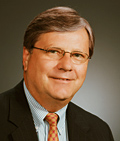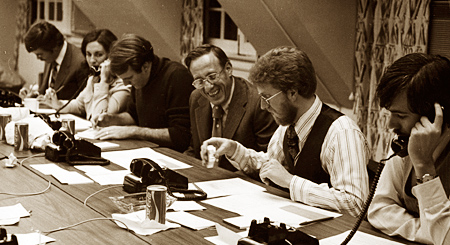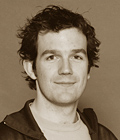| A
collaborative journey
1 | 2
| |
 |
| Flashback
1979 "One of the lessons I learned through
student activities at Kellogg was the role
of the leader in defining a vision of what
could be in an organization, and then working
hard to make reality catch up to that vision.
Once we defined the GMA as a vibrant, active
organization providing real benefits to Kellogg
students, many people were willing to build
that reality. That's a leadership lesson I've
come back to many times in my career."
Fred Hundt '79, Graduate Management
Association president |
|
|
| |
|
Enduring
culture unites past and current students
The
strength of the Kellogg culture over the years is remarkable,
and it has evolved: Today, students play important roles in
nearly all aspects of the school, partnering with faculty
and administration to bring more academic rigor to the curriculum.
For instance, student ideas are reflected in the enhanced
Pre-Term orientation program -— an elaborate annual
event orchestrated by second-year students for the benefit
of the incoming class — and the Social
Enterprise at Kellogg major.
Clearly,
Kellogg students do not have to wait until graduation to become
leaders — opportunities to do so are everywhere at the
school today, says Dean Jain. They can join dozens of clubs,
including the Business
Leadership Club, the Black
Management Association and the Women's
Business Association, or others engaged with the larger
community, such as Business
With a Heart, the Neighborhood
Business Initiative and the Social
Impact Club. They can also participate in running one
of 12 student-driven annual conferences addressing subjects
as disparate as marketing, technology or private equity. Civic
leadership opportunities present themselves in the form of
events like Pre-Term and Day
At Kellogg (DAK), an on-campus recruitment effort.
"Even
before attending Kellogg, students [during DAK] find that
the culture here is one that allows all individuals to explore
interests and to test and tune each of their personal leadership
skills," says Affiong Bassey '06, co-chair of
the Black Management Association (BMA). Most Kellogg organizations
encourage students to assume leadership roles during the first
year, she says, providing the chance to gain immediate experience
through DAK and the student government.
"The
environment at Kellogg is extremely vibrant and not taking
on a role in a club or organization would detract from your
overall MBA experience," adds Clay Virgil '06,
BMA co-chair. Both students note that the BMA is an organization
founded on the principle of being a family.
"We
hold one another responsible for our academic success as well
as for our personal and professional development," says
Bassey. The group provides very strong support for its members,
she explains, including tutoring and one-on-one mentoring.
As
is typical at Kellogg, the BMA strives for school-wide inclusion,
even though its mission is explicitly oriented to "develop
Black leaders."
Says Virgil, "We continue to involve the entire
Kellogg community in all we do and include everyone in our
'family.'"
This
sense of family, along with a diverse portfolio of opportunities,
attracted Marc Landsberg to the school as a student
in 1987. Having little previous business experience, but a
desire to master marketing, he looked for a world-class school
that also demonstrated a "tremendous commitment to cultivating
the human side of business" as much as the corporate
fundamentals.
 |
| Shoulder-to-shoulder
with students and alumni during a 1976 fundraiser, Dean
Emeritus Donald P. Jacobs has a laugh in between making
phone calls to generate support for the school. |
"I
wanted to make the connections in my professional life that
mirrored the sorts of relationships I wanted in my personal
life. I had a very strong sense that Kellogg was going to
be that kind of place, and obviously it was," says Landsberg
'89, who became GMA president and today is the president of
Arc Worldwide and a member of the Kellogg Alumni Advisory
Board.
He
viewed his Kellogg School experience as both an obligation
and an opportunity. "I felt there was a real stewardship
opportunity during this two-year window to make a difference
for students who came after me," Landsberg says.
This
sense of stewardship is passed from class to class at Kellogg,
a central part of the school's culture and a quality that
takes root easily in many students — even when it initially
surprises them.
"I
didn't come to Kellogg planning to serve on the student government,"
says Barry Grant '03, now senior product manager for
Pay Pal/eBay. "But I quickly learned that to really experience
what it's like to run a large organization and develop the
managerial people skills, there's no better way than to go
for the GMA presidency. I knew I would be partner-managing
this very bright, top-of-the-top group of students, while
also answering to a constituency of 1,300, including the administration.
"I
figured if I could do this well, it would prepare me for managing
in the real world."
The
administration always listened to students, says Grant. Ideas
ranging from a ceremony to honor Kellogg alumni who died in
the 9/11 attacks, to facilities improvements or cafeteria
menu planning saw action as a result of the GMA partnership
with the school, he says.
This
team-oriented environment fuels the school's academic life,
says Dean Jain. "Leadership has several components for
us. We emphasize the critical importance of knowledge; students
are co-creators of knowledge with our faculty. Of equal importance
are the soft skills, the human touch of leadership,"
he explains. Social responsibility, adherence to a strong
ethical code and a spirit of what the dean calls "positivity"
— or the passionate pursuit of innovative solutions
despite obstacles — round out the major leadership components
instilled by Kellogg.
 |
| "After
receiving my offer from Kellogg to spend the
spring and summer working for nonprofits in
Mozambique and London, I saw firsthand the
positive impact they made on their local communities
and society as a whole. My work with the Kellogg
Social Impact Club has focused on how we can
communicate that corporate social responsibility
as an important part of every true leader's
guiding values, and that for-profit business
can be a significant catalyst for change." David Hegarty '07 |
|
|
|
| |
|
Due
diligence sharpens students
Student
contributions have proven so valuable in part because of the
respect Kellogg School faculty and staff show their younger
collaborators. This respect includes taking students seriously
enough to challenge their ideas, sharpening them in the process.
Professor
David
Besanko recalls the dynamics between students and staff
on the curriculum committee in 2001 and 2002. The committee,
chaired by Besanko who at the time was senior associate dean
for academic affairs, was tasked with reviewing the school's
offerings. Among the major initiatives to come out of this
process was the Pre-Term program, which was debated robustly
by all parties. Of particular concern to students were proposed
changes to shorten class sessions slightly. This shift was
part of a plan to introduce a Management and Organizations
course that now begins the school year, permitting students
to enroll in core courses such as finance or marketing sooner.
The school viewed these changes as beneficial to students
seeking to bolster their skills in advance of summer internships,
increasing their odds of obtaining one.
"Students
certainly had a voice on this package of proposals,"
says Besanko. "The process helped us on the curriculum
committee and in the administration who supported these proposals
but who were eager to see them thoroughly aired. It gave us
the peace of mind to know that we weren't forcing something
on students without them having a say."
Ultimately,
says Besanko, the faculty makes curriculum decisions, but
the school certainly values student input and strives to garner
student approval.
Mark
Moore '03, who served alongside Besanko on the committee,
appreciated this framework. The former GMA vice president
recalls the experience as being "friendly and united,"
with brainstorming sessions generating many ideas that were
then carefully considered.
"The
administration was cautious at implementing change —
open and receptive, but careful to make sure that all alternatives
were considered," says Moore. "I learned the importance
of due diligence in building a case for change. A good idea
gets you halfway there, but the devil is in the details. It
is critical before presenting an idea that you have thought
through every contingency, considered every option, researched
every angle and briefed every stakeholder."
Such
insights are learned from experience, an opportunity afforded
by these student-faculty partnerships, says Dean Jain.
"At
Kellogg, we regard students as more than just customers, and
we think of our alumni too as partners, lifelong partners
who are aligned equally with us," he explains.
The
roots of such partnership are long, dating back decades and
interwoven with those individuals whose pictures appear in
Ed Wilson's office library. While the mid 1970s are a lifetime
ago, they are also where the origins of the Kellogg School's
team-oriented philosophy first sprang to life, says Wilson,
noting the development of the Organization Behavior Department
and the role of professors such as Robert Duncan in
establishing a collaborative environment at the school.
"Before
this, working in groups would have seemed like cheating,"
says Wilson. "This team concept may not seem so startling
today, but can you imagine how much more rewarding the academic
experience is when you work with others in an interactive,
participatory environment, seeking answers to challenging
problems?"
|



